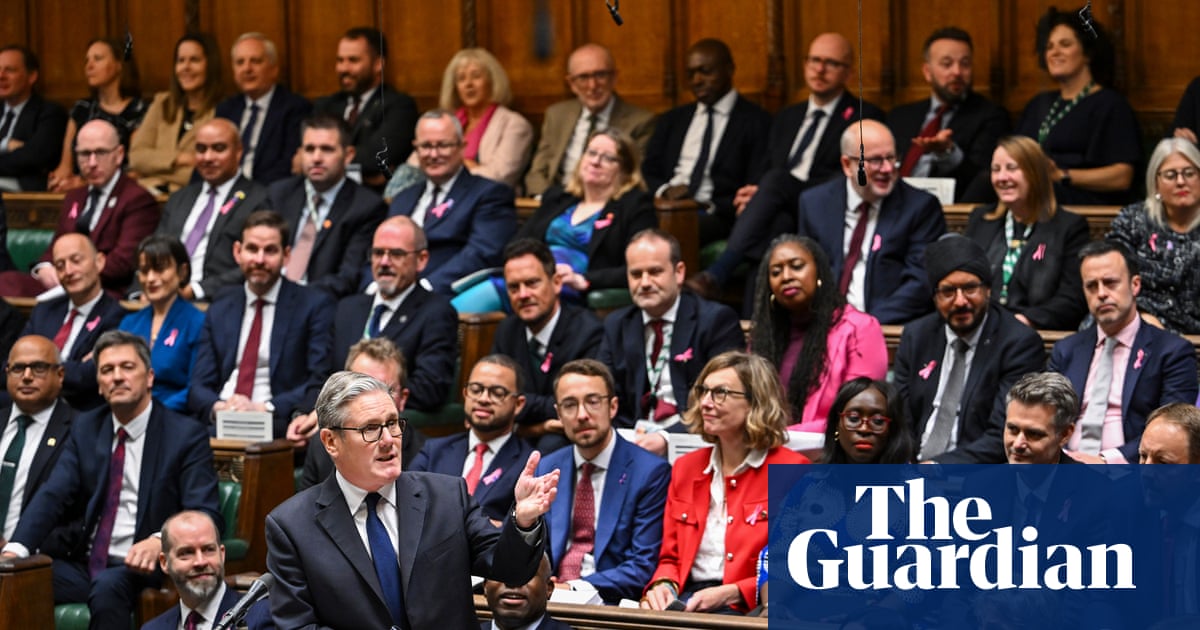
The Crown Prosecution Service abandoned a case against two Britons accused of spying for China despite being told by the UK’s deputy national security adviser that Beijing’s intelligence agencies “harm the interests and security of the UK”.
Three witness statements were released by Keir Starmer on Wednesday night in an effort to draw a line under a row over why the case was dropped against the two, one of whom also warned the other in a message: “You’re in spy territory now.”
Charges against Christopher Cash, a former parliamentary researcher, and Christopher Berry had fallen away because prosecutors could not obtain evidence from the senior civil servant that Beijing represented a “threat to the national security of the UK” over “many months”.
On Wednesday, under pressure from the Conservatives, Starmer said at prime minister’s questions that the government would publish the evidence, three witness statements written by deputy national security adviser Matthew Collins.
The third statement written in August appears close to the specific threat language sought by Stephen Parkinson, the director of public prosecutions, which was deemed necessary following a ruling in an unrelated spy case.
It described China’s intelligence services as “highly capable” and that they “conduct large scale espionage operations against the UK to advance the Chinese state’s interests and harm the interests and security of the UK”.
“China’s espionage operations threaten the UK’s economic prosperity and resilience, and the integrity of our democratic institutions,” it continued, noting that China state-linked hackers compromised the UK Electoral Commission and engaged in “online reconnaissance activity” against some MPs’ emails in 2021.
Earlier on Wednesday, the chairs of five parliamentary committees met with Parkinson to discuss how they will scrutinise the affair.
According to one report, the director of prosecutions told them the statements were “5% less than the evidence threshold that was needed” although the CPS declined to comment.
Other statements made by Collins were more nuanced. The civil servant’s second witness statement, made in February, said the government was “committed to pursuing a positive economic relationship with China” – though it also noted that China was the “biggest state-based threat to the UK’s economic security”.
The prosecution was suddenly dropped last month in what had been expected to be a high profile case under the 1911 Official Secrets Act – prompting accusations from the Conservatives that Labour had not allowed Collins to supply the statements demanded by the prosecutor because Starmer and his national security adviser, Jonathan Powell, wanted a more positive relationship with Beijing.
Responding to Conservative claims of political interference, Starmer said at prime minister’s questions it was “absolutely not” the case and said Kemi Badenoch, the leader of the opposition, had made a “completely scurrilous allegation”.
In a series of robust exchanges in the Commons, Badenoch accused Starmer of not being honest about what had happened. “The charges were brought under us, the case collapsed under them,” she said. “Can the prime minister tell us what changed and what collapsed the case?”
Starmer turned his fire on the Tories, saying “it was their failure and they are just slinging mud”. He argued the only reason the case was withdrawn was because the previous Conservative government did not designate China as a threat to the UK.
“To be clear, had the Conservatives been quicker in updating our legislation – a review that started in 2015 – these individuals could have been prosecuted, and we would not be where we are,” he said.
On Wednesday night Conservatives argued that the release of the witness statements was “limited” and “falls short of what was requested”.
A party spokesperson said that Collins’s witness statements showed “the extent of the threat that China poses to the UK” and that it was therefore “all the more shocking that the prime minister knew of the imminent collapse of this trial, but did nothing to stop it”.
No 10 said Starmer was told the trial was on the brink of collapse “a couple of days” before the CPS announced it, but it insisted it was not for him to intervene in the matter. “It is for the DPP or the CPS to make a decision on a criminal case,” the prime minister’s spokesperson said.
The pre-first world war legislation, now repealed because of its age, required prosecutors to prove China was an “enemy” – and one available definition to prosecutors was that Beijing represent a current threat to the UK’s national security.
Cash had worked for the Conservative MPs Alicia Kearns and Tom Tugendhat, while Christopher Berry was a teacher based in China. They were arrested early in 2023 and charged in April 2024, but both men had denied the accusations and always maintained their innocence.
The first witness statement summarises some of the allegations made against Cash and Berry.
Cash was accused of passing on information about British politics, the UK’s China policy and parliament that Berry put into research briefings for “Alex”, an individual who was judged to be working for Chinese intelligence, who in turn allegedly passed them on to a senior member of China’s ruling politburo.
In the first statement, it is alleged that at one point in July 2022, Berry met “a senior CCP [Chinese communist party] leader”.
Cash learned of by voice note on 18 July 2022 and responded in multiple messages a day later. One of which said: “You’re in spy territory now.”
In a statement late on Wednesday night, Cash maintained that he was “completely innocent” and said that “at no point did I ever intentionally assist Chinese intelligence”.
He said he had been placed in an “impossible position” because “the statements that have been made public are completely devoid of the context that would have been given at trial”.
A spokesperson for China’s embassy in the UK said: “We have emphasised from the outset that the allegation about China instructing the relevant British individuals to ‘steal British intelligence’ is entirely fabricated.
“We urge certain individuals in the UK to stop this kind of self-staged anti-China political farce.”
On Thursday, Ken McCallum, the head of MI5, is expected to spell out the threats posed by China in an annual security update.
Whitehall insiders are frustrated by the failure to prosecute Cash and Berry and reiterate they stand by previous warnings about Chinese hacking and industrial espionage.
Earlier on Wednesday, Dominic Cummings, who served as Boris Johnson’s chief adviser, said China had breached secure high-level systems involving Strap material, a security classification for highly sensitive information, and this had not been made public.
But this was denied by former senior cybersecurity officials working in Whitehall and by the Cabinet Office within hours.
A Cabinet Office spokesperson said: “It is untrue to claim that the systems we use to transfer the most sensitive government information have been compromised.”
Other senior officials said the story was untrue.


